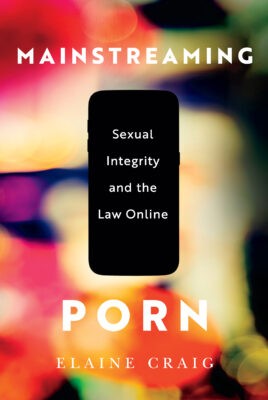In Mainstreaming Porn, Elaine Craig offers readers an in-depth look at not sex nor eroticism, but rather, the machinations of a capitalist and corporate backdrop that inform the two. Craig makes clear from the start that she has no intention of criticizing sexual appetites or niche desires, instead asking us to reconsider what constructs might be informing such desires, and what motivations those constructs might have. “My focus is on free, mainstream porn,” she writes, “because my concern is with sexual integrity, including the impact of sexualized violence on our sexual integrity.”

Mainstreaming Porn
Sexual Integrity and the Law Online
Elaine Craig
McGill-Queen's University Press
$39.95
paper
400pp
9780228022398
She starts by confronting Pornhub’s Non-Consensual Content Policy, which maintains that Pornhub prohibits content promoting non-consensual acts. And yet, Craig points out, a quick online search suggests otherwise; she highlights popular searched keywords, like “Surprise Anal” and “Steal-Thing.” She goes on to ask, “What meaning do users make of the marked disjuncture between what is purportedly prohibited on a platform and the titles and/or content on that platform?” In other words: yes, ideally the sex workers involved are participating in consensual sexual acts, thus not undermining the policy – but can users distinguish this fact between the promotion of content that is specifically highlighted as non-consensual? It would appear it is this kind of terminology that requires sexual literacy, something Craig is concerned our society deeply lacks.
Well, if a company is skirting around its own policy, Craig then asks what this reveals about the law. In what ways is the law failing to uphold an anti-discriminatory rhetoric surrounding women and their sexuality? If Pornhub says they care about treating women fairly, why are women getting penetrated as a “surprise”? Later in the book, Craig focuses on the particular genre of incest porn. The reality offline is that incest is illegal, yet these online publications host multitudes of videos in which so-called parents, or step-parents, commit non-consensual sexual acts with their so-called children. And more disturbingly, the offspring appear to enjoy it. Craig then highlights real-life testimonials from survivors of incestual sexual abuse. Reading them, one can clearly see there was never any pleasure involved.
Craig informs readers of the different kinds of visitors an online publication can receive. Though the platform may claim to be a community (which is to say, people in communication with each other), there are both “tourists” (who consume content without directly interacting with anyone) and “residents” (registered members). The platforms look to these different users and accumulate data, that in turn curates their most financially prosperous content across the board.
Craig further claims that the “consolidation of corporate power in this way, combined with the iterative, data-driven ‘creativity’ that contributes to the content in mainstream pornography, undoubtedly renders some sexual scripts hegemonic.” These platforms normalize what kind of sex sells, rather than fulfilling the idea of sex derived from a clear want of pleasure and health.
Craig’s text is an urgent request to reconsider the ways in which our society (specifically the sector that constitutes pornographic digital publications) promotes the dehumanization and discrimination of young women. She asks readers and consumers to interrogate what the wants and goals of their own sexual desires might be, versus the wants and goals of such a corporation. Do such platforms really care about your pleasure, or only their own?mRb






0 Comments